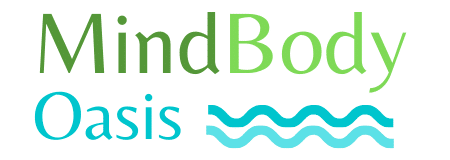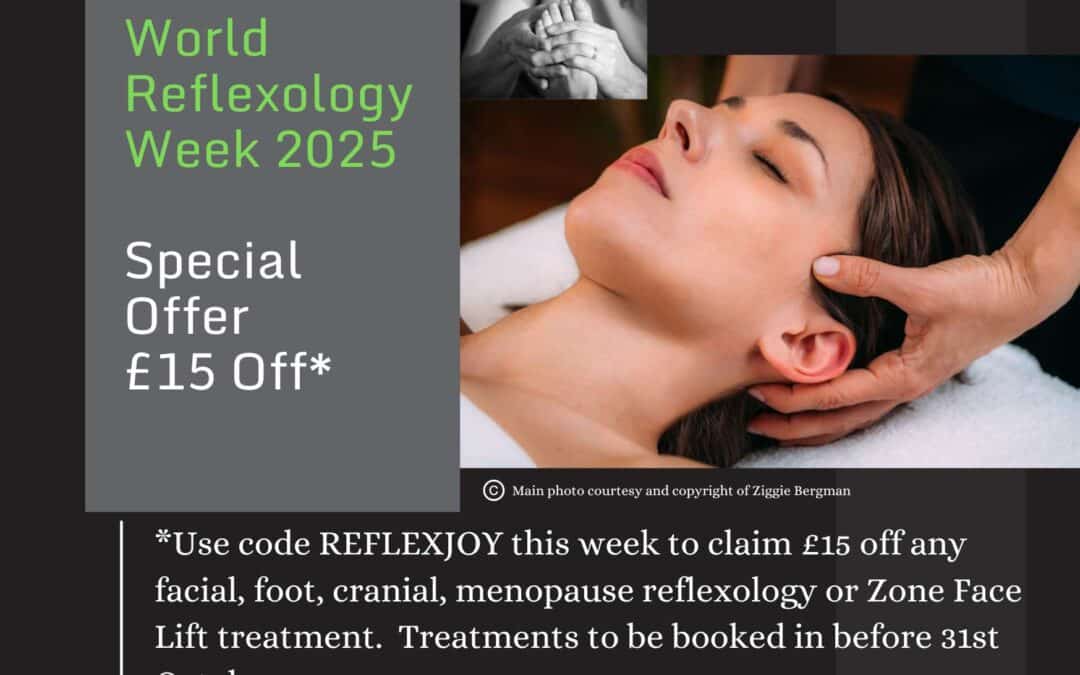Introduction
In our fast-paced, always-on world, stress isn’t just a nuisance—it’s a serious drain on our health. Between juggling roles as mum, wife, therapist, workshop-organiser, Nordic walking & QiGong teacher, marketing, non-profit work … I know first-hand how quickly energy becomes depleted. When demands are high and rest is scarce, our immune system, nervous system and endocrine system pay the price: higher cortisol, more inflammation, poorer sleep, and increased vulnerability to illness, mental burnout and even accelerated ageing.
Reflexology has been my anchor through all this. As a qualified foot, facial and cranial reflexologist, I practise what I teach—I receive regular monthly treatments (facial or foot) not only because it feels wonderful, but because it works. This week, during World Reflexology Week (22nd–28th September), I want to share why it works, what the evidence says, and offer something special to help you access those benefits too.
What Reflexology Offers: More Than Just Relaxation
Here are some of the ways reflexology supports health, especially under the weight of modern living:
- Deep relaxation, nervous system calm & lowering of stress hormones
Reflexology helps shift the body out of the fight-or-flight state. By activating rest states (parasympathetic nervous system), reflexology reduces heart rate, lowers blood pressure, decreases respiratory rate, and helps ease anxiety. This isn’t just anecdotal: in various trials and meta-analyses, foot reflexology has been shown to produce significant drops in systolic and diastolic blood pressure, heart rate, and respiratory rate. PMC -
Reduced anxiety & emotional stress
Several trials have looked specifically at patients undergoing anxious situations (e.g. before cardiovascular procedures) and shown that reflexology significantly lowers anxiety as measured by validated scales. PubMed+1 In a pilot study of healthy volunteers, reflexology produced a powerful short-term effect on state anxiety, and reductions in cardiovascular parameters. PubMed -
Improved sleep, fatigue management & mood
Fatigue, sleep disturbance, feelings of overwhelm are common in busy lives. Self-administered foot reflexology has been shown in small studies to decrease perceived fatigue, reduce depression scores, and improve subjective stress and well-being. In a study of female undergraduates, for example, self-foot reflexology reduced perceived stress, fatigue, and improved skin temperature (a proxy for relaxation) though it did not change cortisol or immune markers in that short term design. PubMed -
Support for immune health (more indirect or emerging)
While evidence is mixed on direct changes in immune cell counts or specific immune markers, there are promising signals:-
One study in middle-aged women doing self-foot reflexology found statistically significant changes in natural killer cell activity and IgG (an antibody marker), along with reductions in depression, perceived stress and blood pressure. PubMed
-
Another recent study in people living with HIV showed that reflexology therapy had a statistically significant positive impact on immune parameters, though more research is needed to understand the durability and clinical meaning of these effects. Liebert Publications
-
-
Helping the body restore, rebalance & repair at a deeper level
When reflexology is done with regularity—in a membership or package model—it helps train the body & mind to more easily reach deep states of rest (theta states, similar to deep meditation), where restorative processes like cellular repair, hormone regulation, and immune recalibration are more efficient. This can mean quicker recovery from stress, less wear on the body, and more resilience.
What the Research Doesn’t (Yet) Show — Understanding the Limitations
It’s also honest and important to note that, despite the many promising findings, the scientific evidence is not yet conclusive in several areas:
-
Many of the RCTs (randomised controlled trials) have small sample sizes, short follow-ups, and methodological issues (e.g. blinding, controlling for placebo or non-specific touch/massage effects). Wiley Online Library+2PubMed+2
-
Objective biomarkers (like cortisol, immune cell counts) often do not change significantly in many studies, or the changes are inconsistent. For example, studies where participants used self-foot reflexology sometimes show improvements in subjective stress/fatigue but not in cortisol levels. PubMed+1
-
Specific claims (e.g. reflexology curing or preventing medical disease) are not supported by current evidence. It is best seen as a complementary therapy—supportive, preventive, enhancing well‐being—not a replacement for medical care when needed. Verywell Health+1
Why Regular Treatments & Packages Matter
Because of those limitations, consistency makes a difference. When reflexology is only occasional, you might get relaxation, maybe a drop in stress/anxiety, but the deeper benefits—endocrine balance, immune support, resilience to future stress—often require:
-
Multiple sessions over time to allow the body to “learn” deep rest, more parasympathetic tone, better regulation.
-
A safe, calm environment (an ‘oasis of calm’) to allow deeper states of mind (theta brainwave etc.), not just the physical input.
-
Self-care between sessions (hydration, good sleep, gentle movement, nutrition) so the work of reflexology can be integrated, not washed out by chronic stress.
That’s why I offer membership / package options (Power of 6; Wellbeing Boost) — they reward commitment, save cost, and help clients build in that regular support.
Reflexology in the Context of Modern Stress
Given how demands have multiplied (digital overwhelm, juggling work, family, social expectations), our baseline “stress load” is higher than many realise. What changes in our bodies when that load is high:
-
Constant adrenaline / cortisol → raises blood sugar, suppresses immune function, causes inflammation, disrupts sleep, impairs mood
-
Nervous system stays in a more sympathetic (“on”) state → harder to enter deep rest / repair
-
Endocrine system (hormones regulating mood, sleep, metabolism) gets thrown off
-
Risk of burnout, anxiety, depression, poor physical health (e.g. cardiovascular, metabolic, immune) rises.
Reflexology helps at multiple points in that cascade: easing anxiety, promoting parasympathetic activation, reducing physiological signs of stress, supporting sleep/mood, lowering “wear and tear” on body systems. While it’s not a miracle cure, many clients find that after a few treatments, life feels more manageable, emotions more stable, sleep deeper, body more resilient.
World Reflexology Week Promo & How You Can Benefit
To mark World Reflexology Week (22nd–28th Sept), I’m delighted to offer £15 off all reflexology treatments at MindBody Oasis: foot reflexology, facial reflexology, cranial reflexology, Zone Face Lift, and reflexology for menopause.
-
Use code REFLEXJOY when booking via Fresha app.
-
Promotion applies to appointments between 25th September 2025 and 31 October 2025.
-
Offer valid for advance bookings; redeemable at point of sale or via the code.
If you’ve been feeling overwhelmed, chronically tired, or just disconnected from your sense of well-being, this is a moment to gift yourself some deeper support.
Take-Home Tips & Self-Care Practices
Even if you can’t get to reflexology weekly or monthly, there are ways to deepen the benefit and integrate more rest & repair into your life.
-
Mini reflexology / acupoint massage at home – simple self-foot reflexology or reflexology on hands/face when stressed, even 10-15 mins, can help reduce immediate tension.
-
Mindfulness / breathwork / meditation to help the nervous system shift into rest modes.
-
Regular movement like QiGong or Nordic Walking helps modulate stress, support circulation & lymph flow, which reflexology complements.
-
Consistent sleep and sleep hygiene – reflexology supports deep rest, but you also need a calm environment, good wind-down routines etc.
-
Hydration, nutrition, rest breaks – to feed the repair work going on during reflexology sessions.
If you’d like help installing a healthy routine in your life, I can assist with advice in all the ways mentioned above.
Conclusion
In a world that demands more and more of us—emotionally, physically, mentally—what we need most isn’t more busyness or pushing through. What we need is rest, repair, rebalancing. Reflexology offers a gentle but potent pathway toward that. It helps lower stress, calm the nervous and endocrine systems, ease anxiety, improve mood, support immune resilience, and bring us back into balance.
I hope this World Reflexology Week gives you permission to pause, receive, and invest in your wellbeing. I look forward to welcoming you at MindBody Oasis—your body, mind and spirit will thank you.

